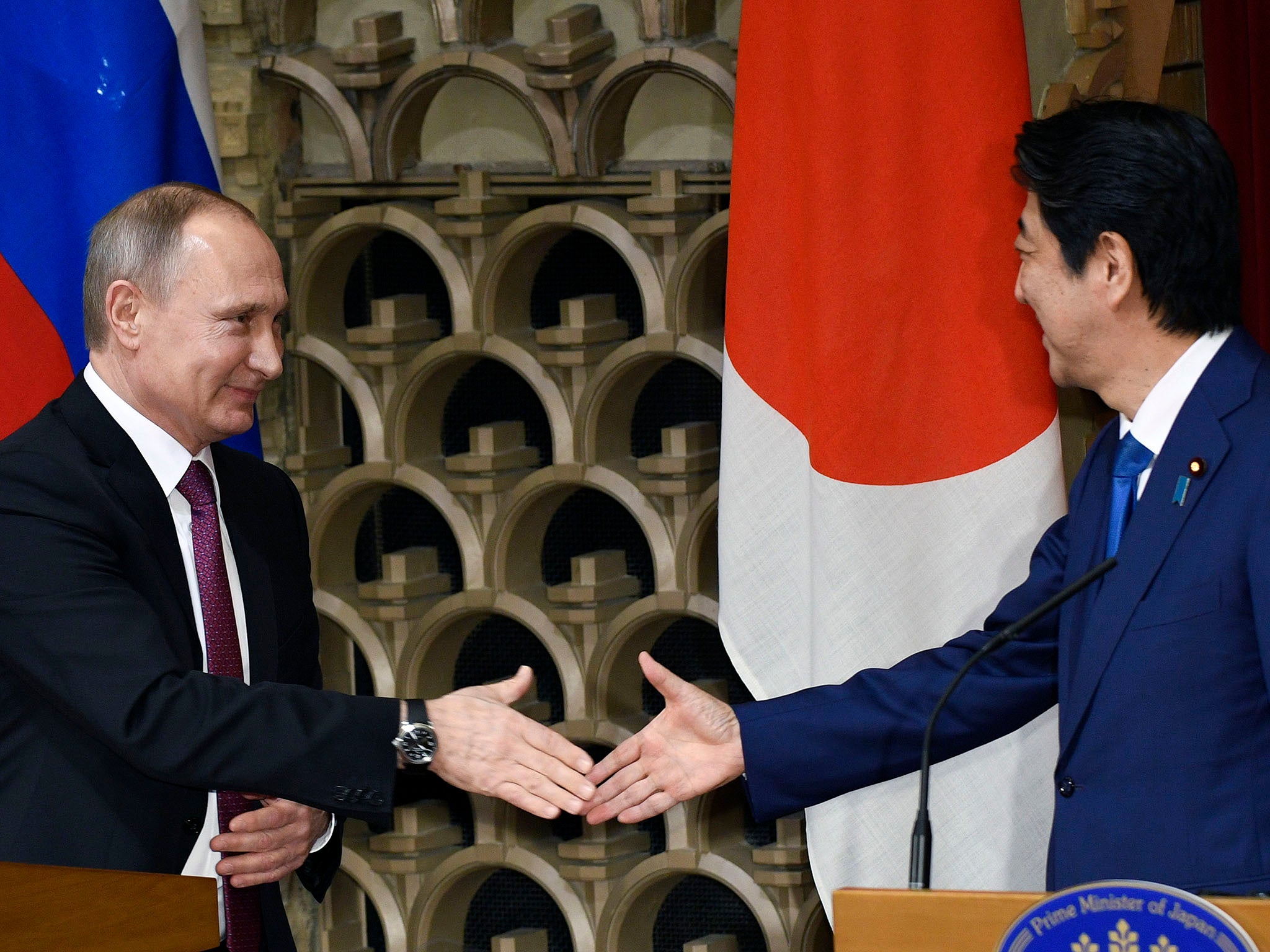Japan and Russia eye economic pact amid stalemate over disputed territory
Ongoing disagreement over the disputed Kuril islands means Japan and Russia have never signed a peace treaty to end World War II

Your support helps us to tell the story
From reproductive rights to climate change to Big Tech, The Independent is on the ground when the story is developing. Whether it's investigating the financials of Elon Musk's pro-Trump PAC or producing our latest documentary, 'The A Word', which shines a light on the American women fighting for reproductive rights, we know how important it is to parse out the facts from the messaging.
At such a critical moment in US history, we need reporters on the ground. Your donation allows us to keep sending journalists to speak to both sides of the story.
The Independent is trusted by Americans across the entire political spectrum. And unlike many other quality news outlets, we choose not to lock Americans out of our reporting and analysis with paywalls. We believe quality journalism should be available to everyone, paid for by those who can afford it.
Your support makes all the difference.Russia and Japan aren't likely to resolve a long-running territorial dispute, but they hope to announce an economic cooperation agreement after their leaders finish talks in Tokyo on Friday.
The two countries have been negotiating the agreement since Japanese Prime Minister Shinzo Abe proposed it as part of a "comprehensive approach" to improving bilateral ties at a meeting with Russian President Vladimir Putin in Sochi, Russia in May.
The two leaders are wrapping up a two-day summit that began Thursday evening at a hot springs resort in western Japan. For Putin, the summit meeting marks his first official visit to a G-7 country since Russia annexed Crimea in 2014. Abe invited Putin even though the G-7 nations, including Japan, still have sanctions on Russia.
"Russia and Japan haven't had very much economic cooperation," Putin said in opening remarks at Friday's talks. "It is necessary to expand the potential of our economic ties."
Abe said the two countries, though neighbours, "have not fully developed their potential" in economic cooperation. He said government and the private sector have been preparing about 60 projects spanning the medical, agricultural, environmental and energy fields.
Russia wants to attract Japanese investment, particularly to its far east. Japan hopes that stronger ties through joint economic projects will help resolve the thorny territorial issue over time.
Putin arrived about 45 minutes behind schedule in Tokyo, because of a mechanical problem with his presidential aircraft. He used a backup plane, according to Japanese media. After a second round of talks, he and Abe are also expected to give speeches to a Japanese business group and visit a judo centre in Tokyo. Putin is well-known for practicing judo.
Abe and Putin spent much of their time Thursday discussing small steps to move forward on the territorial dispute that has prevented their countries from signing a peace treaty to end World War II.
Abe said they discussed possible joint economic projects on the disputed islands. A sticking point: Japan says they should be operated under a special legal status that does not raise sovereignty issues. Russia, which governs the islands, wants them to be run under its law.
The territorial dispute centres on four southern Kuril islands, which Japan calls the Northern Territories. Japan says the Soviet Union took the islands illegally in the closing days of World War II, expelling 17,000 Japanese to nearby Hokkaido, the northernmost of Japan's four main islands.
Putin expressed concern about the deployment of U.S. missile defence systems in Japan, calling them an overreaction to North Korea's missile program, Japanese media reported.
Abe assured him that they are limited to self-defence and do not pose a threat to neighbouring countries, while stressing the importance of discussing defence issues amid growing security concerns in the region, they said.
To that end, the two leaders agreed to resume "2+2" talks among the countries' foreign and defence ministers, Russian Foreign Minister Sergey Lavrov said. Lavrov, who is accompanying Putin, attended the first and last "2+2" meeting three years ago.
Join our commenting forum
Join thought-provoking conversations, follow other Independent readers and see their replies
Comments